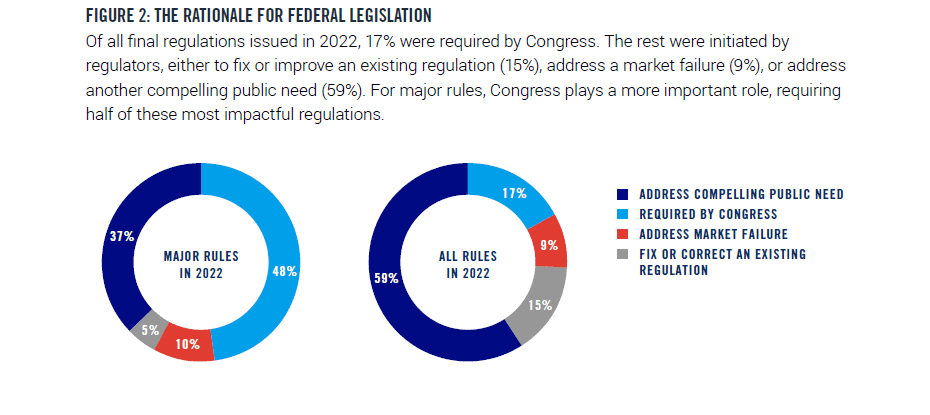
Support H.R.8204: Regulatory Early Notice and Engagement Act
The Problem:
Did you know that only 17% of rules, less than one-fifth, are directed by Congress, and that most are initiated at the instigation of regulators?
The Solution:
H.R. 8204, the “Regulatory Early Notice and Engagement Act (RENEA),” introduced in May 2024 by Reps. Reschenthaler, Davis, and Burchett, aims to increase transparency, accountability, and public engagement at federal agencies by requiring they provide specific information when proposing a rulemaking.
The Ask:
We encourage you to co-sponsor H.R. 8204, the Regulatory Early Notice and Engagement Act. This bipartisan legislation would reform the federal regulatory process to make it more transparent, accountable, and responsive to the public. The end result will be smarter, growth-oriented regulation.
Bill Summary:
H.R. 8204, if enacted, would require federal agencies to maintain a regulatory early notice webpage on their websites. One week after initiating a new rulemaking activity, a federal agency would have to make public on its website and send to Congress a regulatory early notice, which must:
- Identify the problem the rule is intended to address and state whether the rule is required by law, necessary to interpret law, or made necessary to address a compelling public need, such as a material failure of private markets.
- State whether existing regulations (or other laws) have created, or contributed to, the problem that a new regulation is intended to correct.
- State whether the agency identified and assessed available alternatives to direct regulation, including the alternative of not regulating.
- Invite the public to provide the agency with recommendations on how to accomplish the objectives of the rule most effectively and at least cost.
Further, the bill would require the U.S. Government Accountability Office (GAO) to develop and maintain a database containing each regulatory early notice and report to Congress on agency compliance with the Act. The GAO already maintains a searchable database of final rules sent to it by federal agencies to implement a Congressional Review Act.
Support for H.R. 8204
This legislation has overwhelming support from America’s business community, including the following groups:
- Alliance for Chemical Distribution
- American Chemistry Council
- American Cleaning Institute
- American Coatings Association
- American Exploration & Mining Association
- American Farm Bureau Federation
- American Fuel & Petrochemical Manufacturers
- American Iron and Steel Institute
- American Petroleum Institute
- American Road & Transportation Builders Association
- AmericanHort
- Association of American Railroads
- Association of Equipment Manufacturers
- Association of the Nonwoven Fabrics Industry (INDA)
- Communications Cable & Connectivity Association
- Composite Panel Association
- Consumer Technology Association
- CropLife America
- Decorative Hardwoods Association
- Essential Minerals Association
- International Sign Association
- IPC – Build Electronics Better
- Lawn & Horticultural Products Work Group
- National Asphalt Pavement Association
- National Association of Home Builders
- National Automobile Dealers Association
- National Cotton Council
- National Grain and Feed Association
- National Federation of Independent Businesses
- National Stone Sand & Gravel Association
- North American Association of Food Equipment Manufacturers
- North American Meat Institute
- Plastics Industry Association
- Polyisocyanurate Insulation Manufacturers Association
- Polymeric Exterior Products Association
- PRINTING United Alliance
- SOCMA
- Southern Crop Production Association
- The Fertilizer Institute
- The Recycled Materials Association
- The Vinyl Institute
- Treated Wood Council
- U.S. Chamber of Commerce
- USA Rice
Benefits of Regulatory Oversight Backed by Data
A May 2024 study by PPI found that if agencies shared their philosophy behind regulations, public confidence in regulation would improve, and elected officials could better exercise oversight.

Click here to read the full study.